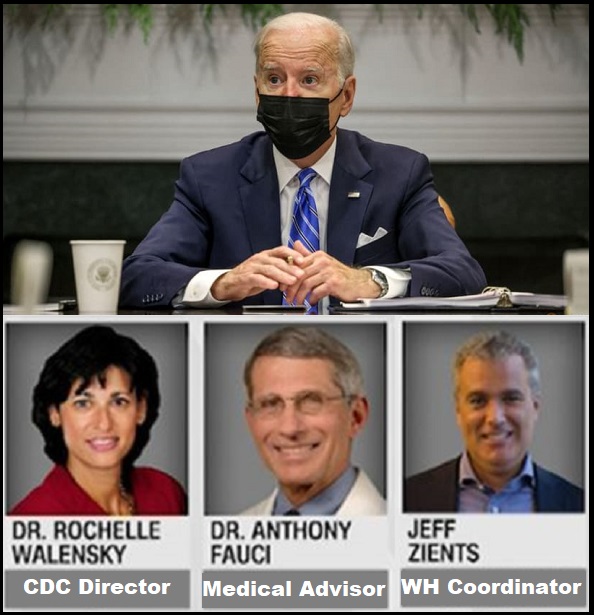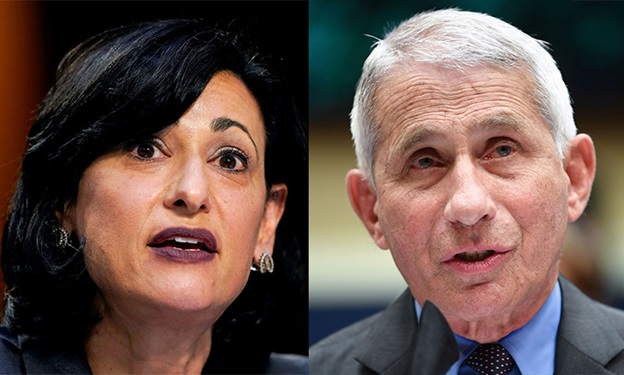This is interesting. On December 14, TechnoFog noted the FDA gave approval to vaccine boosters amid 16 and 17-year-olds without consulting the medical advisory panel on safety and efficacy of the policy shift {SEE HERE}.
As correctly noted at the time, “This is the FDA making a cost/benefit calculation without knowing the costs or benefits. It doesn’t know the real risks, because it didn’t study the potential for adverse reactions in kids aged 16 – 17 years,” yet, the FDA did it anyway.

The issue is actually quite alarming considering there are multiple studies showing that specific age group, especially young males, were negatively impacted by vaccine created heart damage. Then again, adverse vaccine outcomes may have been the reason why the FDA never wanted to convene a medical advisory board before giving the approval for a vaccine booster to the group most at risk for the adverse outcome.
Regardless of FDA motive, the Washington Post is now following-up on the issue pointed out by Techno Fog and calling out the Biden administration for having the FDA ignore medical community advice:
(WaPo) […] Before last month, the standard practice was for the agencies to convene standing outside advisory committees, whose members inspect the relevant data, debate it and vote. That did not happen in these cases, meaning that the costs and benefits of these policy moves, from a medical perspective, were not fully aired publicly and discussed in advance.
One of us is the former deputy director of the FDA’s Office of Vaccines Research and Review; the other is a former acting chief scientist at the FDA. We believe that much is lost when decisions like these are made without consulting outside experts — whatever one believes about the merits of the policies in question.
At this point in the pandemic, the world faces a host of new questions related to vaccines and boosting. The recommendations of experts on the outside advisory committees are needed more than ever — so the scientific community can understand the empirical bases for decisions, and so the public can be assured that science, not politics, is driving vaccine policy.
In each of the recent decisions we’ve mentioned, at least some experts would probably have voiced opposition (based on earlier scientific debates and votes the two committees had taken, which supported different conclusions). That these experts were not given a chance to make their cases could hurt the credibility of these agencies. (read more)
Ultimately, what both Techno Fog and the Washington Post are now noting is a background of politics, not science, driving the medical policy of the Biden administration.
We can only imagine the media and public reaction to a Trump administration if they ever attempted the same type of policy and ignored medical advice.
The issues here compound when you realize the same FDA is going to push a third dose of Pfizer vaccine into children aged 2 to 5-years-old. The pharmaceutical scientists are now claiming the dosage of the vaccine was not strong enough for the kids, so they need to inject them with even more vaccine to avoid a virus that is non-threatening to them.
New York Times – A low dose of the Pfizer-BioNTech coronavirus vaccine did not produce a potent immune response in children aged 2 to just under 5 years of age, the companies announced on Friday, a discouraging setback that threatens to keep the vaccine from younger children.
[…] In a conference call with investors and analysts on Friday, Kathrin Jansen, Pfizer’s head of vaccine research, said the company planned to seek authorization for a “three-dose series” in children, instead of the originally planned two doses. If the revised strategy works, “we would have a consistent three-dose vaccine approach for all ages,” she said. (read more)
Interesting…. “investors and analysts“. Go figure.



At my daughter’s job, ten ladies have gotten their boosters and two now have pericarditis.
May the rest catch up. There is a wicked penalty for stupidity.
Wishing illness on people who haven’t realized they’ve been lied to is just wrong. It’s not what I want to see in the treehouse.
It’s not what I want to see from the government, either.
And the difference is as plain as a wolf is to sheep.
Those that were working full time jobs and taking care of children and older in-laws don’t have time to research like we retires do!
I tried to warn others but they would not listen. It scared some that either had friends that died of Covid-19 or got really sick that did not have the shot, so they decided to get the shot. I keep praying they will be OK. I think some got 1 booster and decided not to get anymore.
Mass Genocide!
Propaganda has done it’s job well and this deeply saddens me.
Add vitamin D3
Thanks for the picture of the Quartet of Fools.
Wish that a MAJORITY would VIEW and UNDERSTAND the Quartet of Fools as the FOOLS they most surely are (and that’s an understatement of what the Quartet truly are), rather than VIEWING and UNDERSTANDING the Quartet as gods of “The Science”.
US hospital assassins for hire. https://canadafreepress.com/article/us-hospitals-fraud-murder-cash-federal-assassination-for-hire-program
I want anyone connected in the medical field that gleefully and willingly participated to pay w/their own lives.
Many of us said this was happening all over the country over a year ago. We know families this has happened to. just in the last few months and the first was in 2020. Got covid, the whole family did, go home, rest, take Tylenol, come to the hospital if you get worse. They all did and all were killed. We’ve even seen the hospital billing… $100,000 for a few days in a hospital in SC, several in NC. Remember Doctor Jension (think thats his name) in WI even told Laura Ingrahm this was happening to his patients a year or more ago? Think he’s running for Governor up there. This is happening everywhere and we were wondering when this was all come out. Angry as hell!
For the record: Dr. Jensen is a Minnesota state senator and is running for governor.
…and not just those who participated “gleefully and willingly”
“Silence in the face of evil is evil itself: God will not hold us blameless. Not to speak is to speak. Not to act is to act.” ~ Dietrich Bonhoeffer
The point is that there are many in the medical community who are either knowledgeable of this evil, or grudging participants. They are no less culpable than the gleeful and willful.
Krause wrote that WaPoOpEd with another former FDA scientist, but not Dr. Marion Gruber, who was Krause’s boss until they both turned over their desks and stormed out yelling “later, bitches!” in September.
Gruber was in the FDA for like 39 years, IIRC. Gruber was the director of the FDA’s Office of Vaccines Research and Review, and Krause was deputy director. Not lightweights. They both allegedly “retired” over the bullcrap that was going on with the boosters in August/September… and I’ve always wondered if the bogus “approval” in August had anything to do with their decision. They went on to publish a “scathing critique” in The Lancet.
“Scientists who quit FDA criticise plan for widespread Covid vaccine boosters”
https://www.ft.com/content/af8da7d4-43ea-41d6-90ee-f959b3675cc5
The Nuremberg Code and the Bill of Rights they want to be things of the past
To be buried in darkness and shadows cast
Erased through all eternity
No more hope for humanity
The sole push for this booster is driven by billions of dollars. Should their be other nefarious reasons for this, we can only imagine. The one thing we do know is this is not science driving these decisions.
These people are sick.
This has gone WAY beyond mere dollars.
Fauci pushing an mRNA vax booster developed for the spike of the ORIGINAL virus on the 32+ polymutated spike of OMICRON…
and in any way claiming that will provide protection
is full-on Dr. Mengele.
He himself warned several times in 2020 of the danger of ADE when presenting the wrong antibodies to a virus.
So how long until pregnant women will be required to have their fetus vaxed before aborting him/her.
Mark my words, in this dystopian world, it’s going to come to that.
I study I recently read showed that for pregnant women vaccinated in the third trimester, there were no adverse results vis a vis live birth. But those vaccinated in the first two trimesters virtually all suffered miscarriage or stillbirth.
I wouldn’t put too much stock into this opinion piece but they are asking the right questions.
Hitlers scientists had people stripping down to take showers and rid them from lice in gas chambers.
Something is changing? Being Biden/woke liberal sycophants isn’t selling newspapers!
Look at the VAERS data on the vaccine. Easy search. DO IT!
Over 9000 deaths from the covid vaccine in just under one year in the US alone.
Just over 5000 deaths from all other vaccines since 1990 (31 years).
Over 400 birth defects from covid vaccine. 99 from all others since 1990 (31 years).
In case you haven’t noticed, the vaccines will never stop coming. Why do we not hear about a cure? Answer – if one is cured, then no more drugs can be sold to them! I pray the lies will be exposed and those guilty ones will get the judgment they deserve!
For good COVID/Vax info – https://anchoredinhope.com/
Why do we not hear of a cure? For the same reason the FDA banned HCQ and IVM for treating the CCP virus.
Emergency Physician in Australia: “I am blowing the whistle”
(Gives a solid medical explanation w/ visual of Myocarditis & Pericarditis he’s seeing in the young that are vaczd)
https://www.bitchute.com/video/dBPmNA8Fe77j/
👉 “These cases are typically associated with an elevated troponin level, and remember, that means HEART MUSCLE CELL DEATH.”
Hmm,,Biden tanking economy. Bad for Amazon.
Watch ANY drug ad on TV and compare:
These “vaccines” are the ONLY drug in existence that the maker will not tell:
What existing conditions are incompatible/contraindicated.
The full range of side effects that may occur.
The conditions upon which one should STOP taking the drug.
They can’t even tell us the DOSAGE of the drug.
Government agencies ostensibly created to protect its citizens
COLLUDING on massive scale with the Pharmaceutical companies and others
in an “experiment” on the human immune system.
I am not pushing that garbage on my kids and I’m definitely not interested. It’s crazy my kids have friends that have rushed out to get this garbage and ended up with Covid. This is not a vaccine it’s a shot.
Two recent preprints demonstrating the pathogenic potential of the SARS CoV-2 S protein alone to cause vascular (endothelial) leakage, coagulation disorders, neurologic and other cardiac disorders ……..yet governments continue to push the purposeful poisoning and decimation of world citizens with S-only gene therapies and ‘vaccines’.
…..the science is there…..and they know it….and will use it towards their twin goals of population control and reduction….and they are counting on the ignorance of the general population.
SARS-CoV-2 Spike triggers barrier dysfunction and vascular leak via integrins and TGF-β signaling
https://www.biorxiv.org/content/10.1101/2021.12.10.472112v1.full.pdf
Jumping to the conclusions in the paper:
-full-length S and the RBD from SARS-CoV-2 were sufficient to mediate barrier dysfunction and vascular leak in an ACE2-independent manner [translation: S protein alone increases permeability of endothelial cells [cells lining blood vessels] and epithelium.
-S modulates expression of transcripts involved in regulation of the extracellular matrix (ECM), revealing a mechanism in which glycosaminoglycans (GAGs), integrins, and transforming growth factor beta (TGF-β) signaling are required for barrier dysfunction
….and this one..
Amyloidogenesis of SARS-CoV-2 Spike Protein
https://www.biorxiv.org/content/10.1101/2021.12.16.472920v1
From the abstract:
SARS-CoV-2 infection is associated with a surprising number of morbidities. Uncanny similarities with amyloid-disease associated blood coagulation and fibrinolytic disturbances together with neurologic and cardiac problems led us to investigate the amyloidogenicity of the SARS-CoV-2 Spike protein (S-protein)……. Amyloid fibril assays of peptide library mixtures and theoretical predictions identified seven amyloidogenic sequences within the S‐protein. All seven peptides in isolation formed aggregates during incubation at 37°C. Three 20‐amino acid long synthetic Spike peptides (sequence 191‐210, 599‐618, 1165‐1184) fulfilled three amyloid fibril criteria:ultrastructural fibrillar morphology. Full-length folded S-protein did not form amyloid fibrils, but amyloid-like fibrils with evident branching were formed during 24 hours of S-protein co-incubation with the protease neutrophil elastase (NE) in vitro.
Have you noticed the big push to take down J&J? The powers that be do not want you to take the J&J jab, they want everyone to take the mRNA jab. They are claiming 9 people have died from blood clots after taking the J&J jab, yet they do not mention all the death and injuries from the various mRNA jabs. BTW: my aunt collapsed and died, on her kitchen floor, the next day after receiving her 2nd moderna mRNA jab. The paramedics told my cousins that they have been seeing a lot of bad reactions from the jabs. Several weeks later the county informed the family that they were listing her death as a side effect from the vaccine. Why don’t we hear of these deaths?
That is terrible! I am so very sorry for your loss!
TIJ, Thank you.
We can only imagine the media and public reaction to a Trump administration if they ever attempted the same type of policy and ignored medical advice.
We don’t have to imagine, I saw this first thing this morning.
PARTISAN DEMS CLAIM TRUMP INTENTIONALLY UNDERMINED PANDEMIC RESPONSE
The House Select Subcommittee on the Coronavirus Crisis has released a report claiming that the Trump administration engaged in “deliberate efforts” to undermine the U.S. response to the pandemic for political purposes. Unfortunately, the subcommittee’s report itself appears to be motivated by political purposes.
At what point can we say these aren’t mistakes and all of this is exactly what was planned?
I am all for giving the benefit of the doubt to people, but at some point you have to look at the totality and question how so many mistakes could be made and then add to it that they are doubling down on all the things that haven’t worked and that make no sense.
Some of the ex FDA people are getting some WaPo space. That is weird. At the same time we have the NYT greeting the news that the vaccine failed to produce a robust immune response in small children as “a discouraging setback that threatens to keep the vaccine from younger children” Quick, someone produce a fake document proving efficacy so these poor deprived children will not have to be sacrificed but, can receive the life saving vaccine. Just wow. The perspective of the person writing this is frightening. Willing to sacrifice children on the altar of a religion since there is no scientific, rational, or logical reason for vaccinating them and believing they are doing good. Actually believing they are protecting them instead of harming them. But then, alleged medical scientists couldn’t ethically withhold the vaccine from anyone that was frightened enough to want it so science be damned, give the people what they want, just a short sharp poke.
EVERYONE! stop getting the vaccine till you read Rbt Kennedy Jr’s book The Real Anthony Fauci: Bill Gates, Big Pharma, and the Global War on Democracy and Public Health...footnoted on every claim – scared the sh_t out of me….Fauci is all about the Benjamins not about our health…top doctors in the world and back RFK’s thesis up up- all footnoted.with links to their studies…a lot more transparent that Facui has been.. Fauci didn’t even run a decent trial of the vaccines (because early trias showed they DIDN’T work and caused health problems).. Meanwhile he and his cronies are making billions off the vaccines…and there is evidence that we who got vaccinatedd are MORE suseptible to reinfection by variants….
We listened to Warroom podcast with RFK today – he explains it all v.well –
https://warroom.org/2021/12/18/episode-1496-fauci-on-trial/
Someone please ask that pile of human feces, Dr. Falsie just how many people have died from the omicron virus. The slimy democRATs want to shut the entire country down again because of a virus whose symptoms are no worse than a light case of the flue or a cold. This is all about power and control.
At some point even the fake news has to cut loose the anchor that the FJB administration has become.
https://www.stuff.co.nz/national/health/coronavirus/127140667/unexpected-death-of-cool-kiwi-bloke-rory-nairn-under-investigation
And here we go:
FLASH ALERT on Fox, Tucker Carlson: Tuberculosis outbreak at Goldman Sachs in NYC.
Found this interesting opinion piece about TB and masks by Karl Denninger at his “Market Ticker” blog site. I like this guy’s stuff, doesn’t pull any punches, opinions factually-supported. His gruff style may not be everyone’s cup of tea, but he’s usually right on target.
https://market-ticker.org/akcs-www?blog=Market-Ticker-Nad
My guess is that they are competing for those record profits and will take their share by any means
The ongoing COVID-19 nonsense here in the United States exists solely and exclusively because our governments have failed to use the correct treatment. They used so-called “vaccines” when Japan has just proven, in less than ONE MONTH, that Ivermectin can wipe out the disease. IVM was awarded the Nobel prize for medicine in 2015. One of the 3 most important drugs in human history: Aspirin, Penicillin, and Ivermectin. Get your Ivermectin today while you still can! https://ivmpharmacy.com
Gee! The government scientists panic when they have to do anything that might shake the cobwebs off themselves and their beloved desks. Usually they just hide until eligible for retirement.
Why not “Green” masks? Why not “Red” for communist, masks? why Black? Because its all Luciferian?
Sundance this is going to turn 180 degrees and be blamed on operation warp speed and Trump will take the blame for the clot shot deaths and they’re going to memory hole the past two years-
Trump went all in on these falsely called vaccines not knowing they were a head fake and were already designed and ready to go – patented at the same time the vIris and vaccine was patented- designed together.
Remember this post-